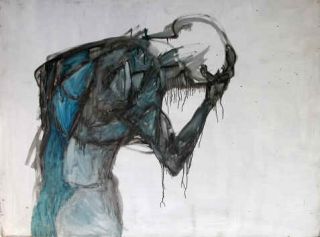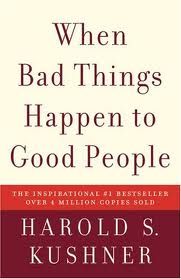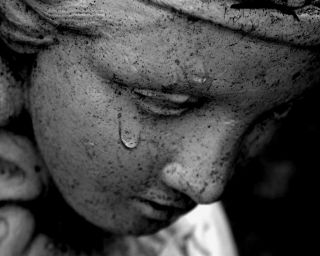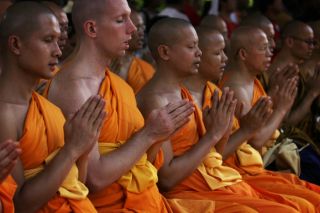Spirituality
On Being Safe in an Unsafe World
Reflections five weeks after Newtown.
Posted January 22, 2013

The most difficult part of the Memorial Service in Newtown for me was listening to several clergymen from Christian denominations tell the parents, “Do not mourn, do not grieve, your loved ones are in their Eternal Home where you will one day be reunited.”
I don’t have a very close relationship with Jesus, but I DO know this much: If Jesus had had a kid, and the kid was shot in cold blood, He would have mourned, grieved, wept, and tore his heart out. That much I know.
But it seems I have another spiritual problem.
Carl Jung believed that most people's psychological issues will only be truly resolved by a spiritual response. Post Newtown, the situation we all find ourselves in is growing more and more difficult, if not impossible, for us to bear. After the shooting, I entered a full-on crisis of faith, and I know I was not alone.
Although I clearly have a spiritual bent, I actually have more in common with atheists than with religious people who have an unwavering faith in an Always-Present, Benevolent God. Yet the latter does seem to be the only thing that could possibly resolve my perpetual conundrum of wanting to believe in the fundamental goodness of people and preciousness of life, yet at the same time being bombarded daily by news of unspeakable atrocities around the world.

Can the faithful among us really feel a Benevolent Presence in the midst of a world gone mad and out of control? A world where hurricanes drown innocents and tear apart homes, a madman shoots 20 kids in an elementary school, 60,000 are dead in Syria, and unspeakable violence is just a given part of our collective human existence?
Who wouldn't be doubting God's Presence right about now?
Last month, my father called to alert me to the news from Newtown, and added: "You're not safe anywhere." (This, after I spent a year with an EMDR therapist trying to uproot the innate lack of safety I inherited from my Mom's family just out of the Holocaust, and now with Dad's latest pronouncement--"You're not safe anywhere"--I'm thinking I may have received the message from both sides and as a result, grew up cautiously creeping about in Fair Lawn-Leave-it-to-Beaversville, New Jersey with my heart pounding as if the Nazis were lying in wait around every corner.)
But are we ever safe anywhere?

For atheists, there is clearly nothing to be found within the random, uncaused world of chaos to explain any of it or protect us from the bad guys: the men with missiles—on either side—the people in suicide vests, the Batman guy in Aurora, plus cataclysmic tsunamis and "Acts of God," the reality of climate change and having to witness polar bears balancing on one leg on a small floating piece of ice, or trying to make sense of the microscopic tick on a leaf that brushed your leg as you jogged by and caused two years of undiagnosed Lyme's disease, while your Mom keeps putting her shoes in the freezer. Atheists have to simply accept that for some reason forever unknowable, they reside on an insane planet. End of story.
My question remains: is it even possible to feel a sense of utter safety in this world in the very same breath that we inhale the daily news? Or is that why Ativan and Klonopin sales are going through the roof? The whole world is having a collective anxiety attack. Is it possible, without a God to turn to, for us to be of genuine good cheer in our present existential condition? Without some workable theology to explain the constant presence of apparent danger if not outright evil among us, is it really possible for us to even relax once in a while, let alone feel safe, or even joyful?
Must we count our blessings in Hell?
But we do not want to merely dress up a miserable Earthly reality with consoling belief systems; that's cheap religion, not true faith in a living, real God. If we're going to find genuine faith in the midst of all the horrors, it's going to have to issue forth from an authentic encounter with "Life-As-It-Is," one of God's more difficult names, the one Zen people would use if they used one.

Rabbi Harold Kushner points out in When Bad Things Happen To Good People that God can't simultaneously be All-Powerful and All-Loving (unless your idea of Love is expansive enough to include the most horrific tragedies and horrors you can possibly imagine.) Clearly an All-Loving God does not have the power to intervene in our lives and protect us from all the bad stuff, because if She did, She would!
Unless we can wait on line as a Jew, for example, about to enter the Nazi gas chamber and crematorium, and still feel held in God's All-Loving embrace, then our God just isn't big enough or real enough to help us tackle the true challenge of being human. On the other hand, it would seem that for the September 11th bombers, Allah was indeed sufficient to escort them through a violent end, so this argument doesn't really hold water either. Jesus on the cross had a similar challenge, to retain faith in the face of adversity and impending death, but we're talking about some big-ass adversity in all of these examples. That's a LOT to ask of ourselves. I think when things get as unutterably terrible as they did in Newtown, we'd be nuts not to question our faith.
I still cling to my idea of a love-based reality where children—and us—are utterly and absolutely safe from bad people, bad accidents, bad diseases, bad anythings. But our experience is exactly contrary to that. Human existence is increasingly fraught with peril. Someone once said, "You can be safe, or you can be alive." To opt for mere safety when, as Helen Keller put it, "Life is either a daring adventure, or nothing," is to downsize your life experience more and more until you never leave the house.
My beloved teacher of many years ago, Stewart Emery, once said, "Nobody told us when we were born that we had arrived in the lunatic asylum of the universe." Meaning, among other things, that everyone is crazy here. The best it ever gets is when some of us crazies begin to recognize the sheer horror of this fragile, mortal human situation, and do our best to at least be a loving and safe presence for others, knowing that virtually everyone we meet, on some level, is scared to death!
Because we are all, each and every one of us, clearly in great danger every step of the way. The message broadcasts within: "Beware! You are not safe anywhere. Neither are your children in first grade; or your spouse, your parents, or your best friends."
Now go out there and have a good time!
Jung was correct. All of this is a spiritual problem. If I base my personal reality solely on the evidence of what the daily news reveals, and there is no God, faith, religion or even generic spirituality to lend a hand, there is absolutely no reason whatsoever that we shouldn't all be EXTREMELY UPSET AND TERRIFIED ALL THE TIME.
Enter the first premise of spiritual thinking: Is there something more? A bigger picture? A way to relieve the terror of being human and all that awaits us on every front, every moment? Is there any consolation for the shattered heart and souls of the Newtown parents and families, and the families of innocent, loved ones everywhere that meet a sudden, violent, undeserved end? I'd guess the answer to that one, even for the most faithful among them, at least initially, is a flat-out "No." Even God is powerless to console the inconsolable.

As a hospital chaplain, I faced people's horrific experiences alongside them, and there were never any words or prayers that were the least bit effective, or even welcome, even to the most religious among them. The only thing I could possibly offer another in the midst of a life-ruining, catastrophic tragedy was my own presence, love, and tears. God or no God, it always seemed to come down to the human heart, not religious belief. Perhaps that is the real Benevolent Presence: us!
God has no chance to show up unless we provide the conduit.
The only useful theology is one in which everything that it is possible to experience as a human being can be included and accounted for. There can be no exceptions. Only that sort of faith is an immoveable, constant rock in the winds of perpetual change and the unexpected.

People meditate, pray, and do countless other rituals and practices to remind themselves of such an inner place of refuge, one that is bigger than all possible circumstances, for that appears to be the only way out of this mess, and yes, as Jung suggested, it is a spiritual solution. It requires being hyper-vigilant, awake and aware in whatever moment you are currently living—this very breath, knowing that this is the first breath of the rest of your life, and/or, at some point, your last. The timing is a complete and utter crapshoot.
Yet even full-time monks, priests and rabbis devote their entire lives to achieving this and usually don't even come close, so what are sluggards like us supposed to do?
Bear the unbearable.
Witness the worst.
Live love and give goodness.
Walk through the valley of the shadow of death and fear no evil.
But are we safe in this valley? Yes and no.
If we are wholly and exclusively identified as our physical body and thinking mind, then we are not even remotely safe in this world. We are all metaphorically running through a field of land mines each and every day, the killing fields of earthly existence, which extend even to a first grade classroom in Newtown, Connecticut.
And yes, we are safe, if we are quiet-minded enough to notice and tune into a core Awareness that remains steady and constant throughout the roller coaster ride of our lives; call it God. The spiritual solution. And we strive to live from that place within us, where we are that Awareness, that connection to Source, that Union with God, such that no matter what happens in the human drama, whether wondrous or unspeakably, intolerably awful, Awareness is a constant. In other words, if we're going to bother having a God, She better be one that remains fully present in the very worst of human situations. Because we can pretty much handle the good times on our own.

Teilhard de Chardin said: "The day is not far distant when humanity will realize that biologically it is faced with a choice between suicide and adoration." When spirituality is awakened within us, we can find adoration, even here, even now, no matter what is happening. Without it, our prospects appear to be pretty bleak, and trust me, nobody gets out of here alive.




